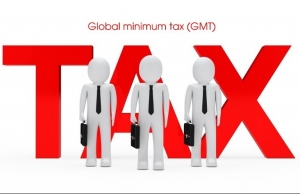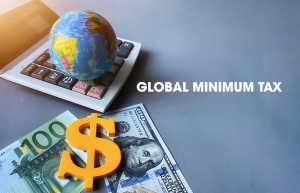Projected GMT consequences on foreign investment
For foreign investment entities operating here, the rules regulate the concept of a qualified domestic minimum top-up tax (QDMTT).
 |
| Do Vu Bao Khanh, senior manager of Tax and Transfer Pricing, Grant Thornton Vietnam |
In particular, tthe constituent entities operating in Vietnam under the qualified MNC would be required to calculate effective tax rate as per jurisdiction, from which additional corporate tax would be topped up to meet the 15 per cent minimum rate and submitted to the central budget.
Declaration forms and additional explanation on GMT are also required for preparation and submission. Further, detailed legal guidance and regulations have been assigned to respective authorities for research and issuance in the upcoming period.
The application of GMT is believed to trigger certain impacts on the inflows of foreign capital, especially from large MNCs, to Vietnam via phasing out of tax incentive polices that the country is offering.
Vietnam is currently applying corporate tax at 20 per cent. Through certain tax incentive policies to encourage investment, corporate tax rates could further result under 15 per cent or even tax exemptions. Therefore, QDMTT will set out a minimum corporate tax rate at 15 per cent in Vietnam and consequently increase the tax burden to certain foreign-invested entities with incentives.
The General Department of Taxation estimated that about 122 MNCs investing in Vietnam could be impacted from GMT. Such a tax burden could further cause considerations in terms of future investment or expansion into Vietnam.
At least two impacts to overseas capital inflows could be identified now. Firstly, GMT could impact the economic development of suburban/rural areas subject to governmental development policies where tax incentives are still considered a primary instrument to encourage investment, which consequently would reduce competitiveness and budget collection at a provincial level.
Secondly, industries which are subject to governmental development policies, such as semiconductors, high-tech, and other large-scale projects would have to face challenges from GMT when tax incentives will no longer be available.
However, GMT may need to be assessed from MNC level as the 15 per cent minimum tax rate per jurisdiction could be seen as inevitable, and the difference might only be which tax authority receives a top-up tax contribution.
In the absence of QDMTT in the jurisdiction of constituent entities, income inclusion rules require headquarters to calculate the jurisdictional effective tax rate, then submit top-up tax at headquarters’ jurisdiction.
Vietnam has recently reported investment inflows from 110 countries and regions, in which the three largest investors have already committed to adopt GMT in 2025 at the latest.
While the 15 per cent minimum tax under GMT will be widely applied and should be considered the new normal worldwide, a tax incentive policy is not the only factor influencing the selection of investment destination.
Vietnam has been maintaining other advantages to attract foreign investors, such as affordable skilled labour, political stability, and a friendly investment environment. The country is also enjoying the fortune from China’s manufacturing outflows and emerging itself as the alternative global manufacturing plant, which could partially compensate for the impact of GMT in the short term.
The Vietnamese government has committed to evaluate GMT impacts and provide proper supporting instruments to maintain its competitiveness index. In this respect, certain jurisdictions have pioneered in research and propose alleviation, for example the Board of Investment of the Thai Cabinet has suggested cash grant to long-term qualified investments that could promote competitiveness index.
Together with the resolution on GMT, the 15th National Assembly has also issued a draft resolution regarding pilot application of supporting policies in high-tech industries, aiming at high-tech enterprises with large projects. Such a draft has demonstrated first-step commitment from the Vietnamese government to certain industries and could be seen as a realistic solution in the event GMT is causing reconsideration from foreign investors.
On the other hand, additional collection from top-up tax could be used for further refinements on infrastructure and labour quality, as well as creating back-up support to taxpayers via proper policies to keep attracting foreign investment capital inflows.
There is still a long journey ahead to form a realistic vision of GMT in Vietnam as detailed legal guidance is still in the development process, but GMT should be seen as inevitable and should only cause impacts in the short term.
 | Vietnam primed for GMT adoption With a long-awaited resolution adopted by the legislature, Vietnam now has a legal framework for applying top-up corporate income tax under a new international system. |
 | Vietnam races to stay competitive with new GMT The international community is speeding towards the implementation of a global minimum tax, and Vietnam is no exception. With countries around the world revamping their tax systems, Vietnam must also navigate this new landscape in order to stay competitive and draw in new foreign investment. |
 | The tax policy impact on luring in fresh investment New tax policies in recent years have contributed significantly to building confidence from foreign investors and creating a competitive and sustainable business environment, directly contributing to Vietnam’s foreign investment growth in 2023. |
 | Mission now clear in journey to adapt to GMT rate Now could be a good time for Vietnam to review investment incentives and raise diversified policies in line with international practices. |
What the stars mean:
★ Poor ★ ★ Promising ★★★ Good ★★★★ Very good ★★★★★ Exceptional
Related Contents
Latest News
More News
- SK Innovation-led consortium wins $2.3 billion LNG project in Nghe An (February 25, 2026 | 07:56)
- THACO opens $70 million manufacturing complex in Danang (February 25, 2026 | 07:54)
- Phu Quoc International Airport expansion approved to meet rising demand (February 24, 2026 | 10:00)
- Bac Giang International Logistics Centre faces land clearance barrier (February 24, 2026 | 08:00)
- Bright prospects abound in European investment (February 19, 2026 | 20:27)
- Internal strengths attest to commitment to progress (February 19, 2026 | 20:13)
- Vietnam, New Zealand seek level-up in ties (February 19, 2026 | 18:06)
- Untapped potential in relations with Indonesia (February 19, 2026 | 17:56)
- German strengths match Vietnamese aspirations (February 19, 2026 | 17:40)
- Kim Long Motor and AOJ Suzhou enter strategic partnership (February 16, 2026 | 13:27)

 Tag:
Tag:




















 Mobile Version
Mobile Version